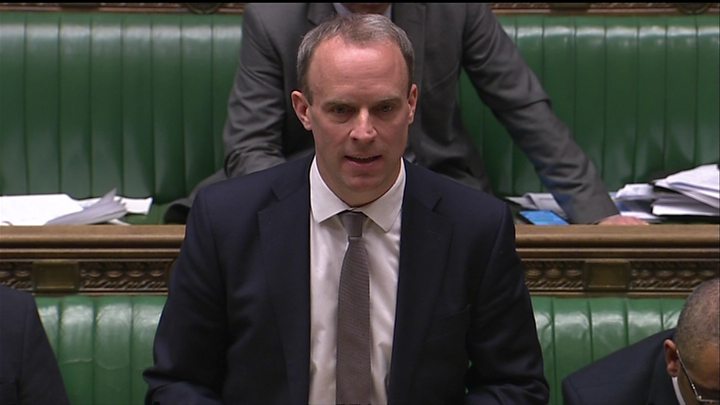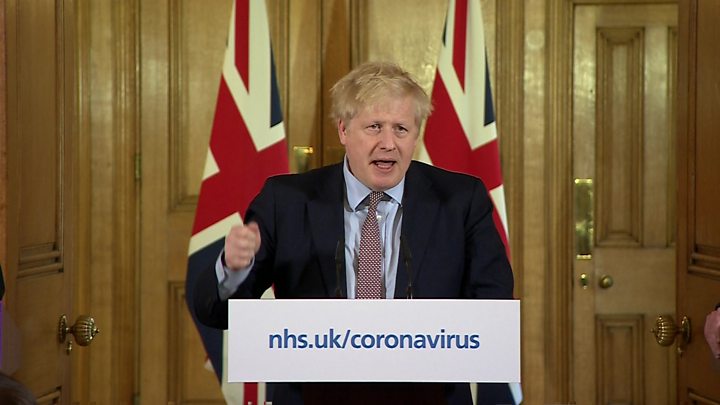Image copyright
AFP
All non-urgent operations in England will be postponed from 15 April to free up 30,000 beds to help tackle coronavirus, NHS England has said.
The emergency policy will be in place for at least three months.
Meanwhile, the government’s chief scientific adviser said it would be a “good outcome” if 20,000 or fewer people died of the virus in the UK.
Disruption to UK firms continues and the Foreign Office advised against all but essential travel abroad.
Chancellor Rishi Sunak is expected to unveil financial measures later to ease the burden caused by the virus.
And the government’s chief scientific adviser Sir Patrick Vallance said the over-70s should avoid having Sunday lunch with their families.
He also advised people taking painkillers to use paracetamol instead of ibuprofen, after French health officials indicated anti-inflammatory drugs could worsen the virus – a suggestion Sir Patrick said “may or may not be right”.
In another day of fast-changing developments across the globe:
- The Euro 2020 tournament has been postponed until 2021
- All Church of England services have been suspended – aside from weddings and funerals
- China reacted angrily to a tweet from US President Donald Trump that described coronavirus as “Chinese”
- French residents face a fine if they are outside without good reason
- The number of deaths in Italy has passed 2,000 and the total in Spain has reached nearly 500
- The International Olympic Committee is meeting later to discuss the summer games in Tokyo
- All horse racing in Great Britain will be suspended from Wednesday until the end of April
- In tennis, the French Open has been postponed until September
- Follow live updates here
NHS England chief executive Sir Simon Stevens said postponing routine surgery would help to expand critical care capacity to the maximum – to prepare for “the likely influx of more coronavirus patients”.
However, cancer operations will continue to go ahead, Sir Simon added.
He also said the health service was working with community services to “unblock” discharge processes to bring back capacity for coronavirus patients.
Sir Simon said the health system in England has about 7,000 ventilators and there are plans to increase this to 12,000.
The NHS is urgently freeing up beds for the rising numbers of patients sick with coronavirus that it expects to see in the coming weeks.
Sir Simon Stevens says work is already underway – the bed occupancy rate is falling, with one in every 10 beds now available.
In total, 3,700 of them are intensive care beds – the type that will be needed to treat those with severe disease.
Sir Simon says elective surgery will be suspended for at least three months, starting from 15 April at the latest, and he’s given hospitals the all clear to begin now.
This could help vacate up to a third of general and acute beds – meaning some 30,000 could be made available for coronavirus patients.
Up to 15,000 of 100,000 hospital beds could be freed up for coronavirus admissions by discharging other patients who are well enough to go home or be cared for in the community.
What he wouldn’t say is whether the measures will ultimately be enough.
Scottish Health Secretary Jeane Freeman said emergency measures the NHS in Scotland would put in place included doubling the number of intensive care beds and suspending non-urgent operations.
The number of people who have died with the virus in the UK has reached 57, after a second death was confirmed in Scotland, as well as a second in Wales.
Some 1,950 people have tested positive for the virus in the UK, according to the latest Department of Health figures – but the actual number of cases could be as high as 55,000.
Sir Patrick told the health select committee that a death rate of one fatality for every 1,000 cases was a “reasonable ballpark” figure, based on scientific modelling.
More than 50,000 people have been tested for the virus in the UK, but the government is primarily testing people who are in hospital. This means many people who have mild symptoms may never be diagnosed with the virus.

Media playback is unsupported on your device
Meanwhile the Foreign and Commonwealth Office (FCO) advised British nationals to avoid all non-essential foreign travel.
The restrictions will be in place for 30 days initially but could be extended, the Foreign Secretary Dominic Raab told the House of Commons.
It is the first time the FCO has advised against foreign travel anywhere in the world.
“UK travellers abroad now face widespread international border restrictions and lockdowns in various countries. The speed and range of those measures across other countries is unprecedented,” Mr Raab said in a statement.
The Archbishops of Canterbury and York have said all Church of England services and other public worship should be suspended until further notice – although weddings and funerals can still go ahead, a spokesman said.
British people currently abroad do not have to immediately return to the UK – except for those in a few countries detailed in the FCO’s travel advice.
But the FCO said travellers should bear in mind that flights could be cancelled at short notice as foreign countries grapple with restrictions being imposed by their own authorities.
Mr Raab said anyone who is still considering foreign travel should be “realistic about the level of disruption they are willing and able to endure”.
The foreign secretary added the government would issue advice on how the flow of food and goods to the UK can be maintained, and that staff working on shipping routes should continue to do so as their travel was “essential”.
The travel advice for British nationals has in part been brought in because of the stringent social distancing measures announced by Boris Johnson on Monday.

Media playback is unsupported on your device
The key new measures the prime minister announced included:
- Everyone should avoid gatherings with friends and family, as well as large gatherings and crowded places, such as pubs, clubs and theatres
- People should avoid non-essential travel and work from home if they can
- All “unnecessary” visits to friends and relatives in care homes should cease
- People should only use the NHS “where we really need to” – and can reduce the burden on workers by getting advice on the NHS website where possible
- By next weekend, those with the most serious health conditions must be “largely shielded from social contact for around 12 weeks”
- If one person in any household has a persistent cough or fever, everyone living there must stay at home for 14 days
- Those people should, if possible, avoid leaving the house “even to buy food or essentials” – but they may leave the house “for exercise and, in that case, at a safe distance from others”
While schools will not be closed for the moment, a union leader has described the “intolerable pressure” teachers are under as a result of the lack of clarity about pupil and staff safety.
Sir Patrick said closing schools remained an option to help curb the spread of the virus but would cause an “enormous problem” for the workforce.
He told MPs such an intervention could have “all sorts of complicated effects” such as that children off school might have to be looked after by elderly grandparents.
Businesses have also called for more details about the measures. Many small firms are unlikely to have insurance cover to compensate them for loss due to the virus, experts have warned.
Chancellor Rishi Sunak is expected to appear at the now daily Downing Street news conference later, where he will unveil more financial plans to help the economy during the pandemic.
‘A war we must win’
At a cabinet meeting earlier, Mr Johnson told ministers: “We are engaged in a war against the disease which we have to win.”
Downing Street said the prime minister urged the government to support businesses “through what will be hugely challenging times”.
Mr Johnson has set up a daily meeting about the virus, which causes the Covid-19 disease, which he will chair.
In other developments in relation to coronavirus:
- The Queen will move to Windsor Castle on Thursday – a week earlier than usual at this time of year. She is likely to stay there beyond the Easter period, Buckingham Palace said
- Ofsted inspections are being halted to “remove unnecessary burdens” on schools, the Education Secretary Gavin Williamson said
- Gatwick Airport said it has terminated the employment of 200 staff as part of “decisive action to protect the business”
- Nissan has suspended production at its Sunderland factory, which employs around 7,000 people
- The Royal Albert Hall is the latest cultural venue to close its doors – following theatres, museums, and most cinemas
- Center Parcs announced the closure of all its UK parks from 20 March to 16 April
- Workers at Amazon’s UK warehouses are being told to do overtime to tackle huge demand
- And the UK’s mobile networks are experiencing problems as people follow government guidance to work from home
Have you been affected by travel restrictions? Are you struggling to get back to the UK from overseas? Share your experiences by emailing haveyoursay@bbc.co.uk.
Please include a contact number if you are willing to speak to a BBC journalist. You can also contact us in the following ways:
